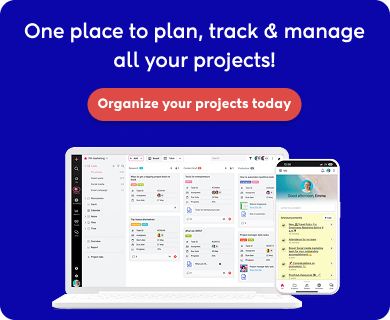Product management tools are the paintbrush to the project manager’s artist. Managing the development of a product involves taking care of innumerable working parts.
Managing the development, designing, testing, and finally the deployment – all this, is not an easy feat. There are many factors to take care of in the planning stage itself, and it only gets harder and less manageable from there.
If you are a project manager, you know exactly what I’m talking about. You have everything on the line, yet nothing is going as planned, not one thing is on track. What do you do when this happens?
The best managers out there will choose automation over chaos. The product management platform will help you stay on track with the requirements of the clients, with the progress of your team, and be ahead of schedule for the product’s delivery.
You wouldn’t be here looking for solutions if there wasn’t a problem. So let’s begin our journey to find a tool that fits your unique needs as we go through 30 of the most reliable management tools for product development.
What are product management tools?
Product management tools can be defined as a set of various tools that product managers and teams use to perform different tasks (prototyping, customer research, managing sprints, product road mapping, etc. ) across different phases of the product life cycle.
Whether you manage an in-office product team or a widely dispersed remote team, you need product management tools that can provide you with a centralized location to plan, execute, and deliver the product successfully.
Product management tools- the powerful combination of different platforms
It’s a challenging task for product managers to oversee a product’s growth from its inception to completion. Before technological advancements made the lives of human beings much easier and more efficient, product managers just had a handful of resources to utilize.
However, with more than a handful of highly functional product management tools today, that’s certainly not the case now. Product management platforms can be grouped into a broad range of categories, like Project Management Tools, Roadmapping Software Platforms, Gantt Tools, and Collaboration Tools.
Different tools are required in different stages of the product life cycle. Product managers and their teams use these tools in tandem to achieve set objectives. This article lists some of the most popular, widely used product management platforms that are designed to help product managers and their teams manage, execute, and deliver their products successfully.
Project management tools
Some product management tools can help you do it all under one roof. These tools can help you achieve a lot more with a lot less effort. These software platforms are rightly called all-in-one since they come with a whole range of features, all curated to bring more efficiency to your work process. Let’s uncover these tools to determine which one can match the needs of the clients as well as the team.
1. ProofHub
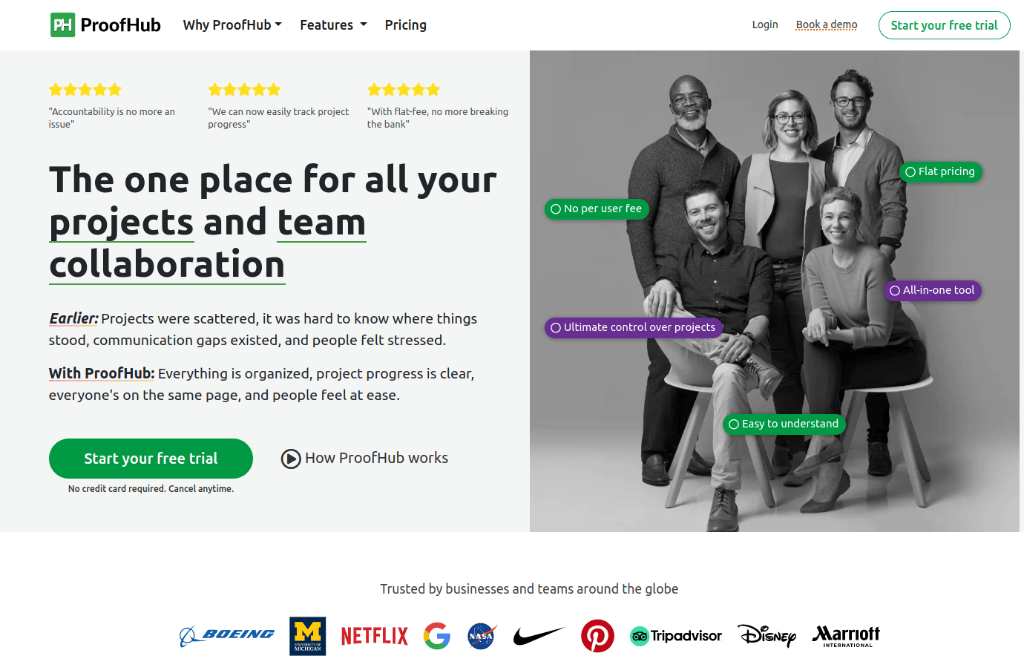
Brace yourselves because you are about to find out what exactly makes ProofHub eligible to make it to the top of this list.
With features like time mapping, collaboration, easy communication, and proofing, ProofHub is a worthy partner, not to mention, a formidable tool for organizations like NASA, Netflix, Google, Trip Advisor, and Pinterest. With its ease of use and highly customizable user interface, it is universally loved by teams and businesses worldwide.
However, let’s dig deeper to find out what makes this tool better than all the others.
Main features include:
1. Gantt Charts
Gantt charts are a highly useful tool for teams that are working towards the development of a product that has to be ready for a timely delivery. Are you confused about the assignees? Are you confused about how all the work items depend on one another? Are you confused about the rate of progress? Are you trying to make sure that everything works on track with the deadlines?
Leave it to Gantt charts in ProofHub to determine all of that for you. Not only do these help you track tasks and the submission of work items, but it also helps you plan the sequences of tasks and define dependencies. Therefore, if you look closely, you would find how Gantt charts can help teams with project planning and road mapping in more ways than one.
2. Table view
A novel approach to viewing and managing tasks, Table view comes with a plethora of benefits for managers, developers, designers, marketing teams alike.
Want a quick overview to determine which task carries more priority? Want to plan your agenda by analyzing task deadlines? Want to quickly define the start and end dates for a particular task?
All of these things become a smooth reality with ProofHub’s Table view. Not only will this feature bring an air of productivity and efficiency to the table, but it will also help your team track their performance and manage their work in a better, more manageable way.
3. Calendar view
A calendar view would be more than helpful for a team trying to manage time and stay on task. Sync your ProofHub calendar with your Google Calendar so you never miss a task, an event, or a milestone. Do you need to quickly add a new event or an important milestone? Do you want to analyze your team’s agenda and add tasks on the go? Do you want to be on schedule and never miss a deadline?
ProofHub’s calendar view will help you accomplish all of that. With its calendar view, not only will you be able to track the number of tasks on your agenda, but you will also be able to track important events and be on schedule with the team’s milestones. Leave it to this view to help your team stay on the same page using different project calendars and defining recurring tasks to ease the burden.
4. Kanban boards
Another innovative addition to the various project management views in ProofHub is one provided by easy-to-use Kanban boards. Do you want to instantaneously alert your teammates about the progress of a task? Do you want to create an impenetrable workflow for your team that is easy to follow and effective for your product at the same time?
The drag-and-drop features of ProofHub’s Kanban boards allow the whole team to implement a time-effective approach to performing tasks. It comes with predefined templates and customizable workflows to save you precious time and effort. Along with that, these intuitive Kanban boards will also help your team actively implement the Agile methodology and track deliverables in real-time.
5. Integrations
In addition to all the product management features that ProofHub so effortlessly facilitates, it also comes with a big bundle of integrations so you can run your operations seamlessly. It has integrations with tools that are widely used by development teams all around the world. Some examples of its most useful integrations would be:
- FreshBooks Classic
- FreshBooks
- QuickBooks
- Google Calendar
- iCal
- Box
- Dropbox
- Google Drive
- OneDrive
6. Group chat
If we talk about management, I can say ProofHub helps you keep up with the most basic to the most complex of project operations. However, what does it do for teams on the collaboration front? The tool in question helps you always stay on the same page with your team with the help of an in-built chat feature that offers instant messaging and group chats.
This feature will help you readily exchange notes, share links, and media files, and achieve a lot more. This is one of the best features in this tool that so effortlessly facilitates communication, and consequently, collaboration within teams.
7. Timesheets
Do you ever wish you could track your team’s performance in terms of time, down to seconds? Do you wish to have the data of billable hours for all your employees on your table at the end of every month? Do you wish you could readily generate, use, and share time data with superiors or your stakeholders on the go?
Well, you would be glad to know that these are some very real things that can be easily done with this tool. Generate custom timesheets, track billable hours, and save and export extensive timesheets across platforms in seconds with ProofHub.
Pricing
ProofHub offers a 14-day free trial. Two flat pricing plans to choose from:
Essential: $45/month for unlimited users (billed annually)
Ultimate Control: $89/month for unlimited users and all features (billed annually)
Customer ratings
- Capterra: 4.6/5 stars
- G2: 4/5/5 stars
2. Smartsheet
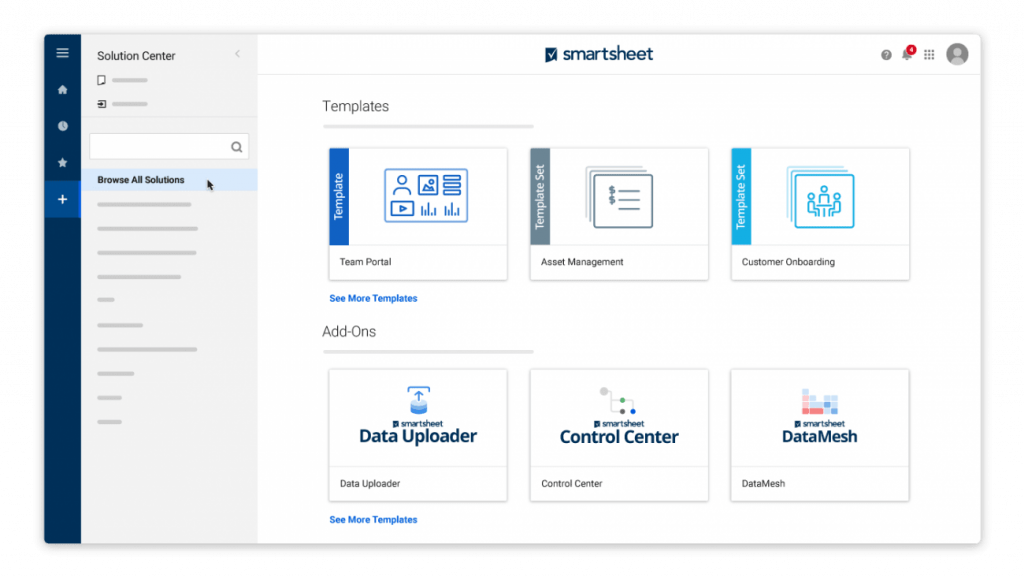
Smartsheet, as the name suggests, is probably the smartest partner you’ll ever get for implementing effective product management. It is a widely used software platform for automating processes like reporting and work management.
Main features include:
- Implementing agile methodology.
- Management of extensive budgets.
- An easy-to-navigate client portal.
- Kanban boards to build functional workflows.
- Active portfolio management.
- Management of all resources from under one roof.
- Customizable workflow as well as project templates.
- Time and expense tracking for effective monitoring of resources.
Needless to say, Smartsheet proves its worth on a lot of fronts. This is why more than 80,000 organizations rely explicitly on this tool for efficiency.
Pricing:
The Paid plan starts from $7/user/month when billed annually.
Customer Ratings:
- Capterra: 4.5/5 stars
- G2: 4.4/5 stars
3. Asana
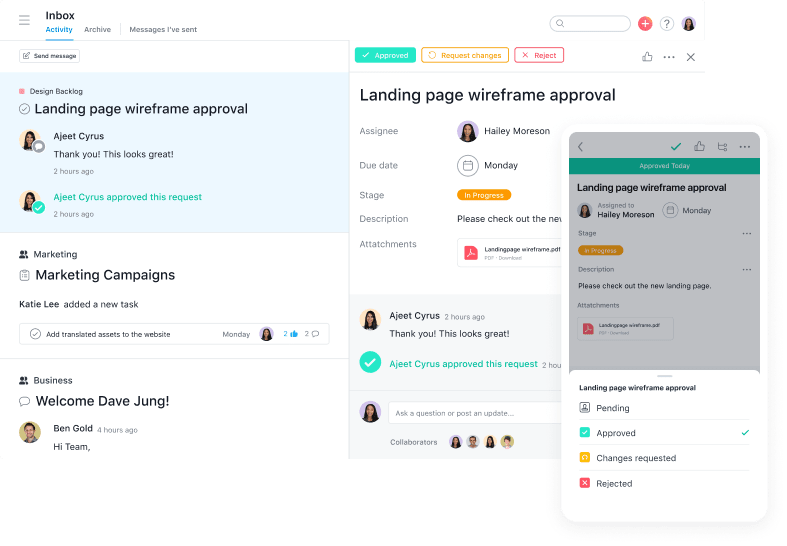
Asana, one of the most popular project management tools in the world, is a prominent addition to this list of product management tools since it possesses some amazing features that help gain control of your development team. It doesn’t matter if your team is working out of the comfort of their homes, from the office, or working as a hybrid collective, Asana makes sure everything stays on track.
Organizations and teams around the world unanimously agree that Asana is a versatile tool that actively helps simplify work processes and bring some efficiency to everyday work.
Main features include:
- Offers extensive backlog as well as resource management.
- Helps record as well as track feedback from clients.
- Supports scrum teams.
- Offers Kanban boards to build commendable workflows.
- Helps create reportable retrospectives.
- Offers a timeline or Gantt chart view to stay on top of deadlines.
- It helps with status tracking as well as time mapping.
- The tool comes with 24-hour customer support.
Therefore, if you are looking for a tool to invest in for all your product management needs in one place, Asana might be a pretty worthy contender.
Pricing:
The Paid plan starts from $10.99/user/month when billed annually.
Customer Ratings:
- Capterra: 4.5/5 stars
- G2: 4.4/5 stars
4. Workfront
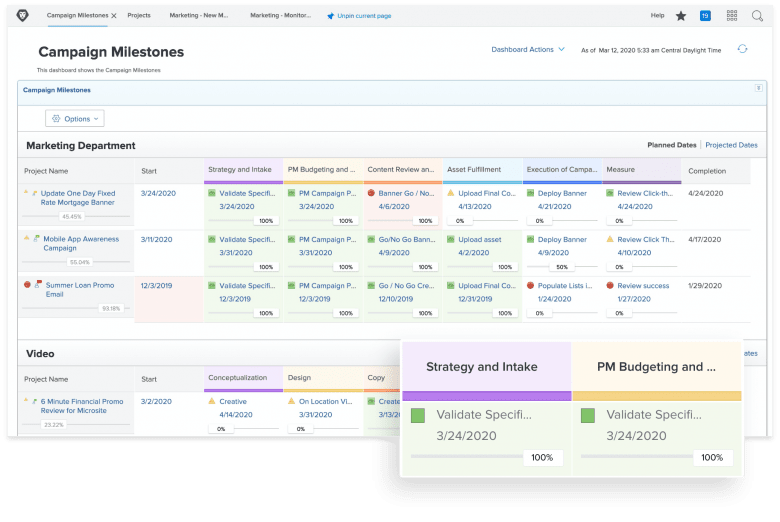
Workfront is a work management tool that can help you track everything from resources to time. It helps in recording ideas, running brainstorming sessions, and documenting important project details.
It is an easy-to-use, reliable tool that comes with a wide array of features that help the team streamline their work processes and come up with efficient solutions for the development of the product.
Main features include:
- It comes with options for version control.
- It helps in organizing and storing various media files and documents.
- It has simple drag-and-drop features that will help you easily navigate your way through Workfront’s interface.
- It comes with calendar management and various integrations.
- It allows project management along with active task management.
- Project tracking and automated reporting are also two of the most amazing features of Workfront.
- It helps schedule various tasks, events, and goals.
- It also comes with some very thought-out search filters to further help you with easy navigation.
Pricing:
Pricing is available on the quote.
Customer Ratings:
- Capterra: 4.3/5 stars
- G2: 4.1/5 stars
5. Airfocus
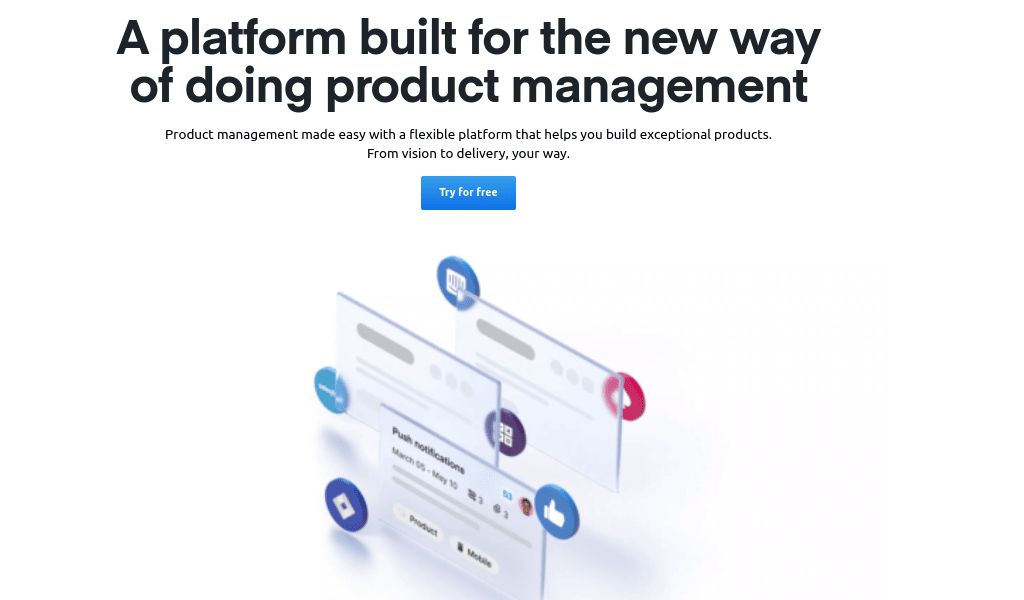
Airfocus is a modular product management platform designed to make product management easy for individuals, teams, and organizations. This flexible platform is trusted by product teams across various industries as it enables users to create a product management stack that suits their needs.
Airfocus is easy-to-use and you can easily integrate it with other popular tools such as Asana, Trello, and Jira. Clear prioritization enables product management teams to take collaborative and transparent decisions. Centralized feedback from various channels and teams provides users with actionable insights.
Main features include:
- Powerful prioritization
- Effective road mapping
- Enhanced collaboration
- Integrations
- Templates
- Modularity
- Releases
Pricing:
The Paid plan starts from $15/user/month.
Customer Ratings:
- Capterra: 4.5/5 stars
- G2: 4.4/5 stars
Road-mapping software platforms
Planning is a crucial part of any product development process. A foolproof plan is sometimes all you need to succeed. Therefore, if you are looking for the best product management tools 2025 can offer, here is an exclusive list of planning tools that will help you build a roadmap and follow it with effect:
6. GoodDay
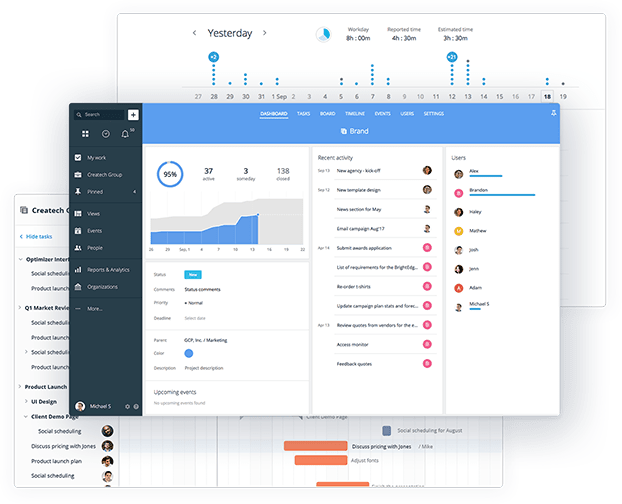
GoodDay is one of the finest, most sophisticated tools to create roadmaps and generate effective plans for the development of a successful product. It has some intricate features that help teams create impenetrable plans that are impervious to errors. It helps in implementing the Agile methodology, which, we all know is a highly popular demand from teams nowadays.
Main features include:
- It helps review tasks and resources on the go.
- It helps with resources as well as budget management.
- It works on the pillars of numerous collaboration features to ensure transparency and accountability.
- It offers a platform for effective communication within the team as well as with the client.
- Helps define as well as track milestones.
- It helps track expenses and cost overheads.
- It helps in tracking and the overall management of client requirements.
- It also offers active percent-complete tracking.
Pricing:
The Paid plan starts from $4/user/month.
Customer Ratings:
- Capterra: 4.7/5 stars
- G2: 4.3/5 stars
7. ProdPad
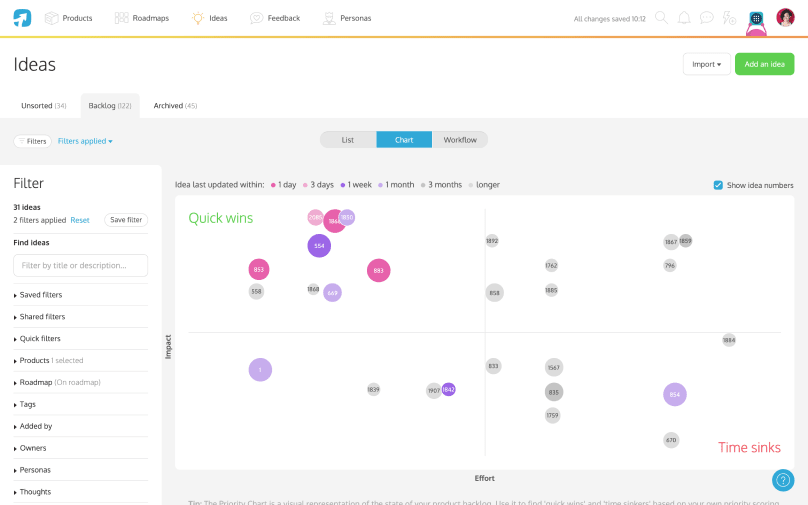
ProdPad is another planning tool that helps document ideas in a very articulate, not to mention, organized way. It helps collect ideas, define tasks, set priorities, and collaborate with the team in real-time to build effective strategies. It helps you map out a way through the whole project and ensure that you have a successful product at the end.
Main features include:
- It offers exclusive features to indulge in lean product management.
- It helps provide an easy-to-understand interface where you can easily understand and analyze your product backlog.
- It allows you to build flexible and customizable lean roadmaps.
- It helps take and give actionable feedback on the go.
- It helps in idea management and effective collaboration.
- It helps measure and track client requirements.
- It helps create actionable surveys for receiving helpful feedback.
Pricing:
The Paid plan starts from $20/user/month, billed annually.
Customer Ratings:
- Capterra: 3.8/5 stars
- G2: 4.3/5 stars
8. LeanKit
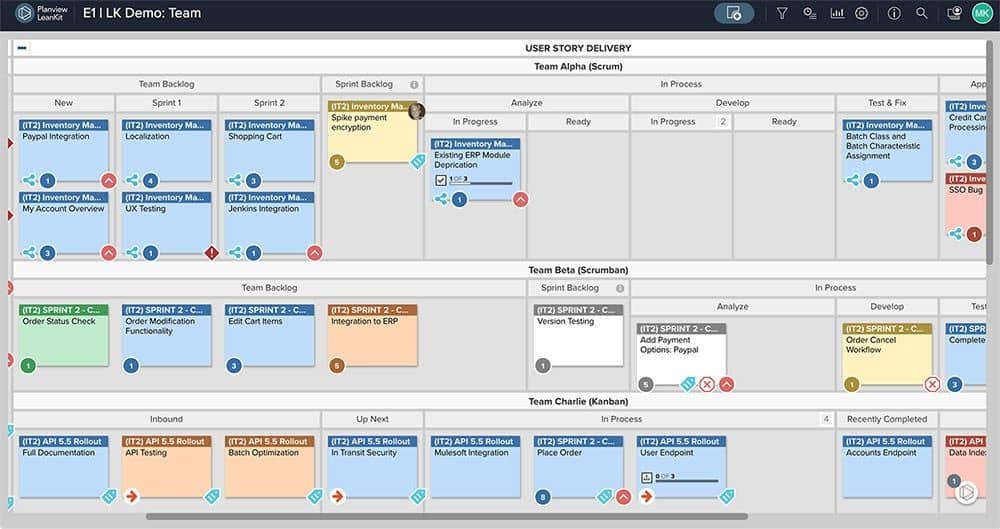
Another amazing tool that can help you plan out strategies and put down actionable roadmaps is LeanKit by Planview. This tool comes with a ton of features that can help you simplify all the intricacies of collaboration as well as feedback. Along with helping you plan and define workable roadmaps, this tool will also help you implement a number of project management techniques for ease of usage. It helps in visualizing the workflow and defining various complexities that can be easily reviewed and edited over time.
Main features include:
- It Helps teams visualize tasks and allow customers as well as clients to keep tabs on the same.
- It helps apply the Agile methodology and maintain transparency with every party involved.
- It shows real-time work status and generates timely notifications.
- Helps identify and define high-value and high-priority tasks.
- It helps leverage past estimates and stats to help you create better plans and prioritize the right client requirements.
- It helps out in identifying risks and bottlenecks with functional Kanban boards.
- Set work-in-progress limits and other metrics that can help managers and stakeholders track down the progress to numbers.
Pricing:
The Paid plan starts from $20/user/month, billed annually.
Customer Ratings:
- Capterra: 4.4/5 stars
- G2: 4.1/5 stars
9. ProductBoard
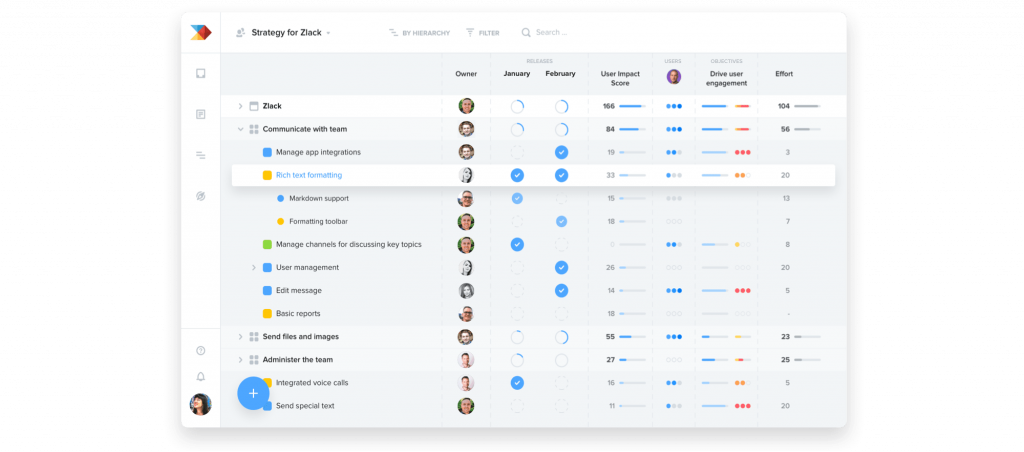
ProductBoard is another product management platform that helps you map out the path to certain success with your development team and stakeholders. It is a tool that helps clients explain their needs better and be more involved in the production of their products. This way clients and stakeholders always know what is going on and find it easy to decide what they need to initiate next.
Main features include:
- Give you a chance to use and implement project management tools and techniques.
- Customize controls and titles for all team members.
- Offers seamless customer support and offers a helpful onboarding process.
- Sync ProductBoard with other development tools such as JIRA and Azure.
- Provide your team with a chance to review the whole project all at once and come together to create actionable plans.
- Comes with usable templates for various roadmaps that serve many purposes at once.
- It offers certain features to strengthen security and privacy.
Pricing:
The Paid plan starts from $20/user/month, billed annually.
Customer Ratings:
- Capterra: 4.7/5 stars
- G2: 4.3/5 stars
10. Roadmunk
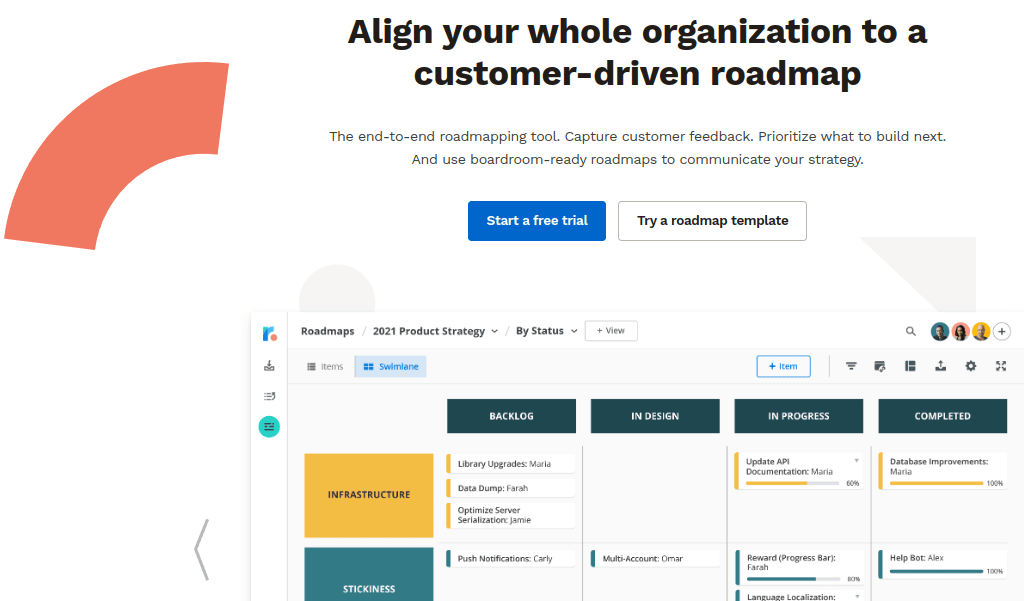
Roadmunk is a cloud-based project management software that allows businesses and industries to capture customer feedback, prioritize product ideas, and communicate strategies via roadmaps. Users can create project roadmaps or choose a pre-designed template that suits their projects. You can also use collected feedback to chalk out product ideas that meet real users’ expectations.
Roadmunk’s simple and powerful features allow you to create multiple roadmap views from one data set and export roadmaps to PNG, URL, and HTML. The Roadmunk API enables you to develop integrations with the tools your team relies on for roadmap planning and execution.
The main features include:
- Timeline roadmap
- Portfolio roadmaps
- Unlimited views
- Swimlane roadmap
- Roadmap integration with Jira
- Review-only access
- Seamless sharing and exporting of roadmap
Pricing:
The Paid plan starts from $19/user/month.
Customer Ratings:
- Capterra: 4.4/5 stars
- G2: 4.0/5 stars
Gantt tools
You might not know this, but the secret to better planning and time management can only be achieved through a reliable Gantt tool. Let’s discover the best of them and find how exactly they can be of use to your team in particular.
11. InstaGantt
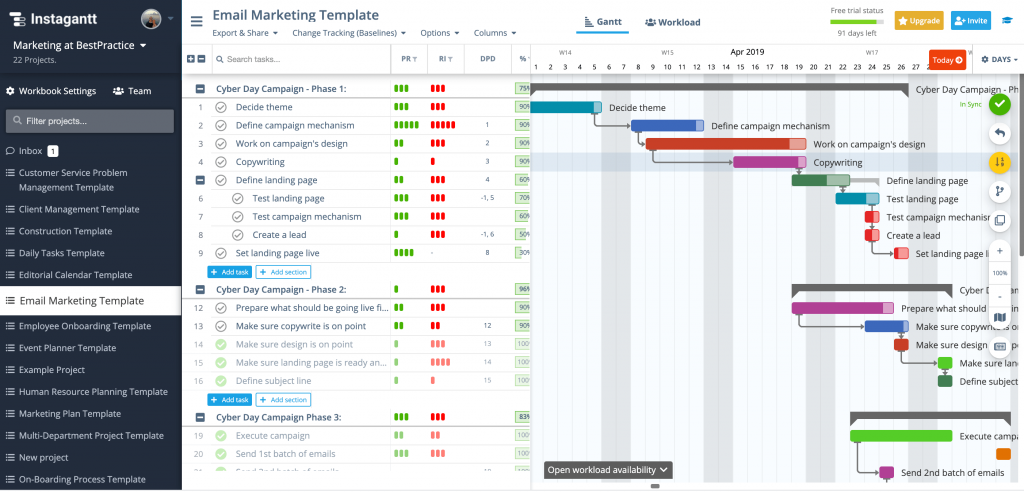
InstaGantt is considered one of the best Agile product management tools out there that can help you reinstate the value of time within the team. From scheduling to managing to tracking, there is nothing time-related that you cannot do with InstaGantt. It is a tool trusted by more than 20,000 teams worldwide and here’s why:
Main features include:
- It helps teams easily edit and modify preferences.
- It provides timely, not to mention, informative alters as well as notifications.
- It helps with capacity management and client request management.
- It helps organize tasks, files, and milestones with color-coding preferences.
- It helps define as well as track dependencies.
- It helps in tracking progress and milestones in particular.
- It plays a big role in task management.
- It even helps teams forecast future agendas.
Pricing:
The Paid plan starts from $7/user/month.
Customer Ratings:
- Capterra: 4.3/5 stars
- G2: 4.5/5 stars
12. GanttPRO
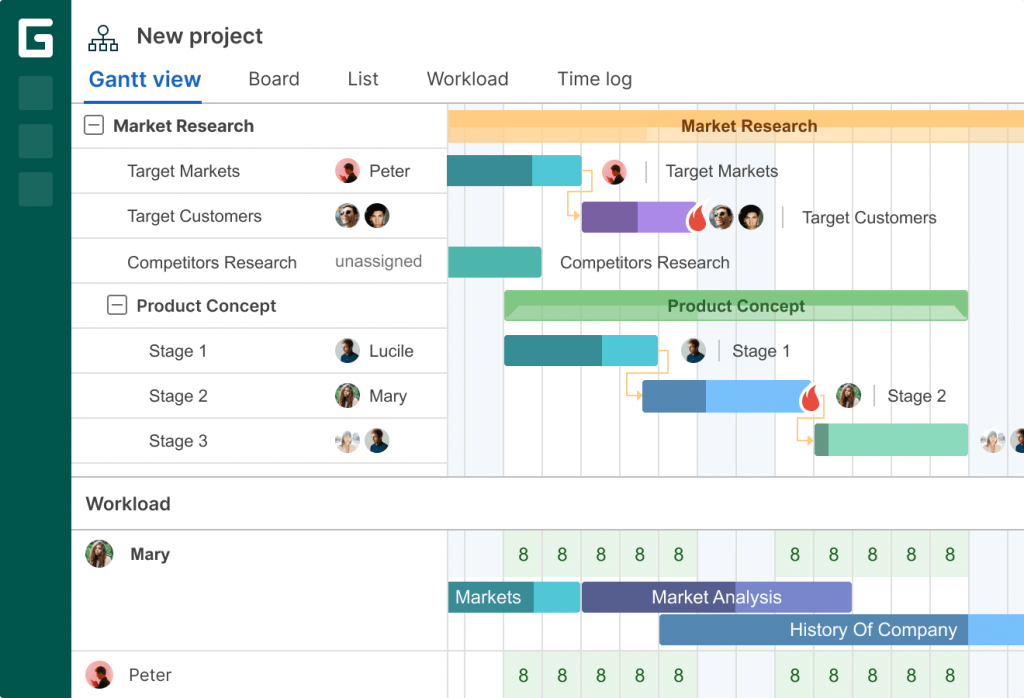
If one were to make a product management tools comparison, one would realize that a Gantt tool such as GanttPRO might be the only tool they need for product management as a whole. This tool helps you make the interface completely your own. With excellent tracking as well as filtering features, it comes out on top in terms of time management tools.
Main features include:
- It provides easy access to customize projects and modify their details.
- Helps you create a functional project calendar that allows easy tracking.
- It comes with a functional board view to view tasks with accessible task cards.
- Offers quick reviewing as well as feedback features.
- It helps you customize your interface according to your needs.
- Provide a bird’s eye view of your projects as well as tasks in a presentable form.
- It provides you a window into the health of the project as well as the progress.
Pricing:
The Paid plan starts from $15/user/month, billed annually.
Customer Ratings:
- Capterra: 4.8/5 stars
- G2: 4.8/5 stars
13. TeamGantt
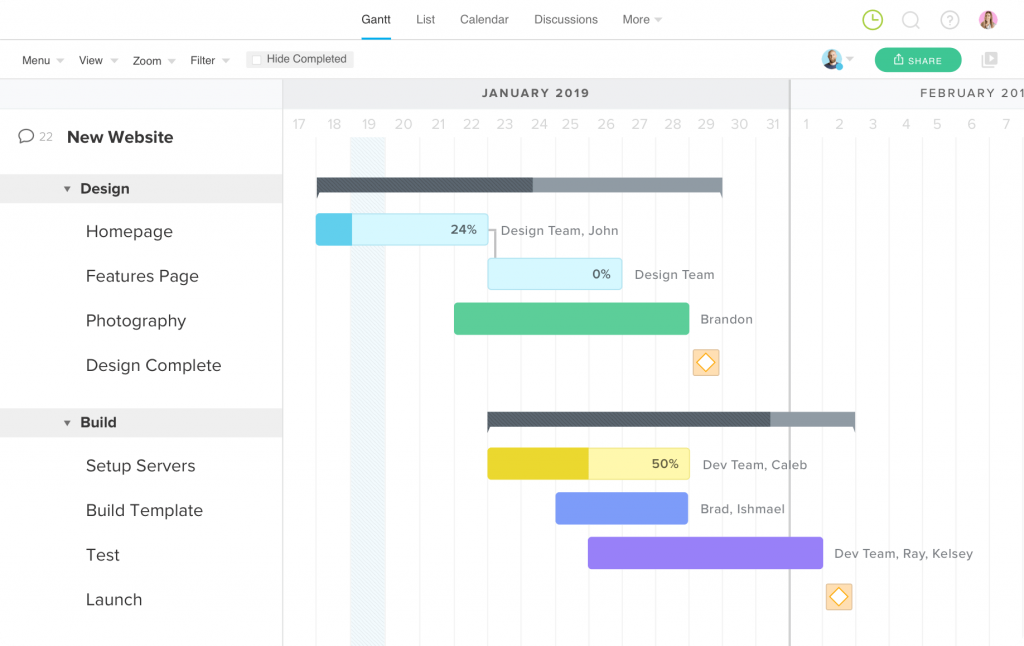
TeamGantt is another powerful tool that can act as a real asset for your product management needs. With a clientele like Amazon, Nike, and Disney, it is backed up by numerous users who love the ease of use and the interactive interface it comes with.
Main features include:
- Set start and end dates for various tasks.
- Reorder, reorganize and prioritize tasks according to user demand.
- Identify bottlenecks and track when the project slips off track.
- Review updates and recent activities on a neat, consolidated platform.
- It allows you to view and analyze all your projects in one timeline view.
- Manage resources, analyze spending, and build doable plans under the same roof.
- Review team workload as well as individual workload to make assignments more manageable.
Pricing:
The Paid plan starts from $19.90/user/month.
Customer Ratings:
- Capterra: 4.6/5 stars
- G2: 4.8/5 stars
Collaboration tools
Another kind of tool that is required by high-functioning development teams is a collaboration tool. This is required for boundless communication both within the team and with the clients. Here are some of the tools that I feel are best suited for product management teams that need effective collaboration:
14. Join.me

Join.me is a collaboration software that helps teams connect with stakeholders to make product management easier and doable. It provides an array of features that make it possible for the team to attain quick back and forth with the clients. It offers various communication channels that can help record and document ideas and various important decisions.
Main features include:
- Document ideas and brainstorm effectively with easy-to-use whiteboards.
- It offers effortless screen sharing that is helpful for the clients.
- It offers users to customize the tool according to their needs and preferences.
- It offers many white-labeling outlets.
- It allows you to give a unique touch to participant bubbles and the backgrounds.
- It helps you connect with the stakeholders through chats, audio calls, and video calls.
- Join.me comes in handy when you need to hold webinars and video conferences.
- Allows remote access and comes with 24/7 customer support.
Pricing:
The Paid plan starts from $12/user/month, billed annually.
Customer Ratings:
- Capterra: 4.3/5 stars
- G2: 4.2/5 stars
15. Workplace from Facebook
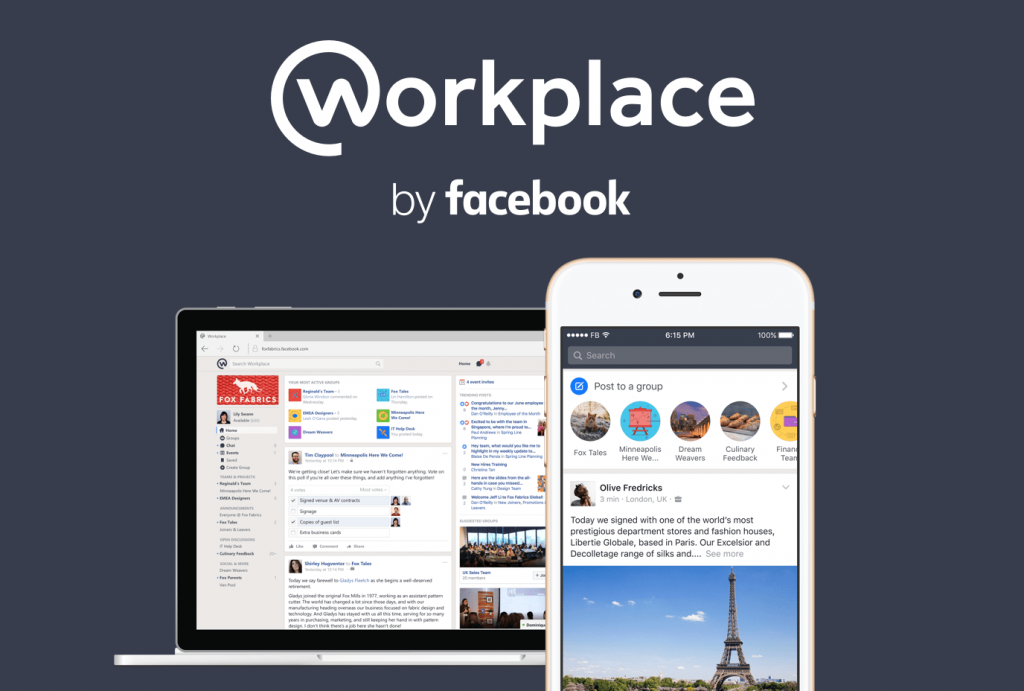
Workplace is the one tool that helps teams actively collaborate through an easy-to-use platform. It has features like chats, group chats, video calling which facilitates a smooth back and forth within the team as well as with the stakeholders. It helps you connect your team across platforms. It is a secure application that ensures the exchange of information in the form of data, media, and/or documents.
Main features include:
- It helps record brainstorming sessions with discussion boards.
- It helps manage projects and tasks to a certain extent.
- It provides a seamless platform for video conferencing.
- Helps build agendas and manage workload.
- Provides the client a platform for action item tracking.
- Helps clients and stakeholders take votes on important issues.
- Allows you to see your agendas on calendars.
Pricing:
The Paid plan starts from $4/user/month.
Customer Ratings:
- Capterra: NA
- G2: 4.0/5 stars
Productivity tools
Productivity tools are designed to help individuals and teams make their work more organized and efficient through several features. These tools also help reduce stress among workers as they’re able to achieve more in less time.
Productivity tools can range from task management, time management, reporting, communication, and collaboration tools. Some productivity tools offer multiple features in one place while some of them specialize in one particular function.
16. Craft.io
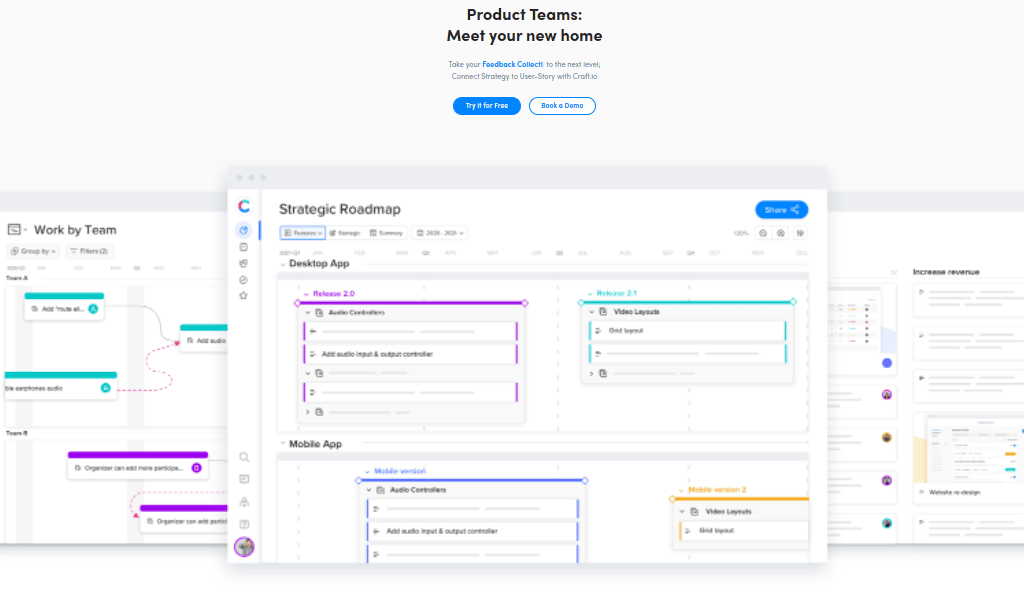
Craft.io is one of the most popular, cloud-based, project and product management tool available today. This tool is designed to assist product managers in encouraging transparency and alignment across their organizations. Using Craft.io, you can customize workflows, add specific fields, track project progress in Scrum story points or time spent, and add priority scores when required.
This productivity solution also enables users to design product roadmaps for upcoming product releases, milestones, goals, and initiatives within a project. This platform can help users improve productivity by allowing you to seamlessly integrate with several tools you already use to boost your workflows.
Main features include:
- Roadmapping
- Strategic inputs
- Spec editor
- Prioritization engine
- Capacity planning
- Feedback control
Pricing:
The Paid plan starts from $39/user/month, billed annually.
Customer Ratings:
- Capterra: 4.4/5 stars
- G2: 4.6/5 stars
17. Wrike
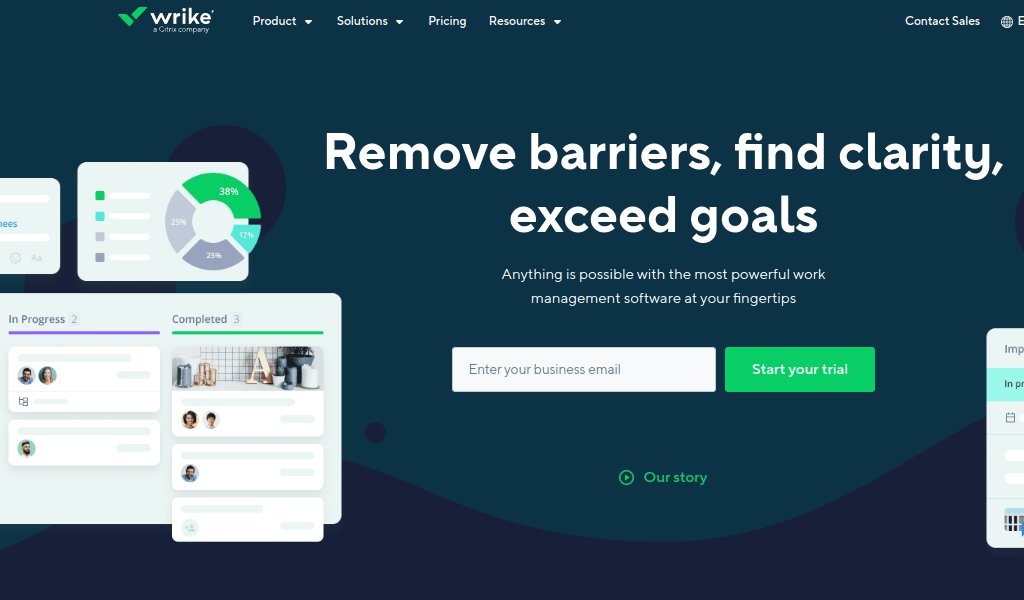
Wrike is a digital work management tool solution that helps users improve productivity by tracking and coordinating projects from a single place.
Wrike is counted among reliable product management tools because it has a simple user interface combined with a range of powerful features that provide both in-office and remote teams with 360 degrees of visibility, powerful automation, and effective cross-departmental collaboration.
You can customize Wrike to suit your organizational workflow and streamline processes. The tool acts as a single source of truth and communication to make it easy for teams and individuals to stay updated on all recent project activities.
Each user gets an inbox for notifications & real-time communications, and a “MyWork” view that displays information related to assigned tasks, a dashboard to filter task lists, a calendar, and analytics.
Main features include:
- Customize tools for any team
- Enable better collaboration
- Instant 360 degrees visibility
- Work intelligence
- Interactive Gantt charts
- Kanban boards
- Purpose-built templates
- Custom request forms
- Shared team calendars
Pricing:
The Paid plan starts from $9.80/user/month.
Customer Ratings:
- Capterra: 4.2/5 stars
- G2: 4.2/5 stars
Customer feedback survey tools
This type of software is designed to help businesses and marketers create and forward custom survey forms to collect feedback from customers. These tools simplify the process of creating survey forms through several in-built pre-designed templates, which you can customize by adding logos, colors, and themes of your choice. Customer survey tools help you get useful insights from customers and make further improvements to your product or services.
18. SurveyMonkey
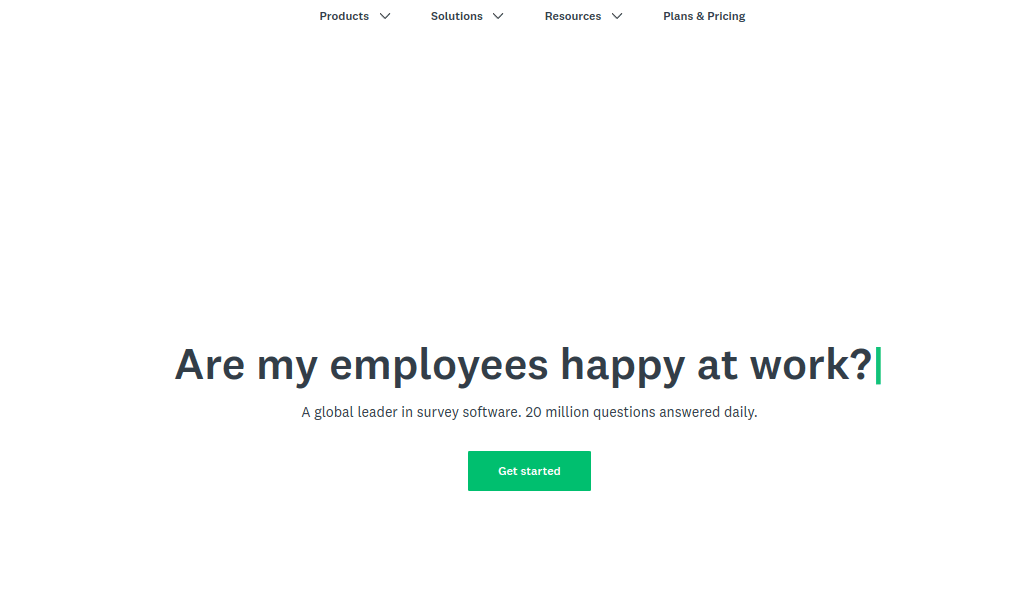
SurveyMonkey is a cloud-based customer feedback survey tool that allows users to create, forward, and analyze surveys collected through emails. Marketing teams can email customer satisfaction surveys to existing customers and publish them on their company websites and social media profiles to further strengthen brand image and increase the response rate.
Using this tool, you can manage multiple users and gain visibility across all survey data collected across your organization. Users can customize surveys by adding logos, corporate colors, and themes.
Main features include:
- Create surveys, quizzes, and polls for any type of audience
- Collect feedback through email, weblink, mobile chat, social media, etc.
- Powerful analysis features
- Integrate data with tools you already use
- Enhanced security including encryption and SSO
- Automated feedback
Pricing:
The Paid plan starts from $25/month.
Customer Ratings:
- Capterra: 4.6/5 stars
- G2: 4.4/5 stars
19. Typeform
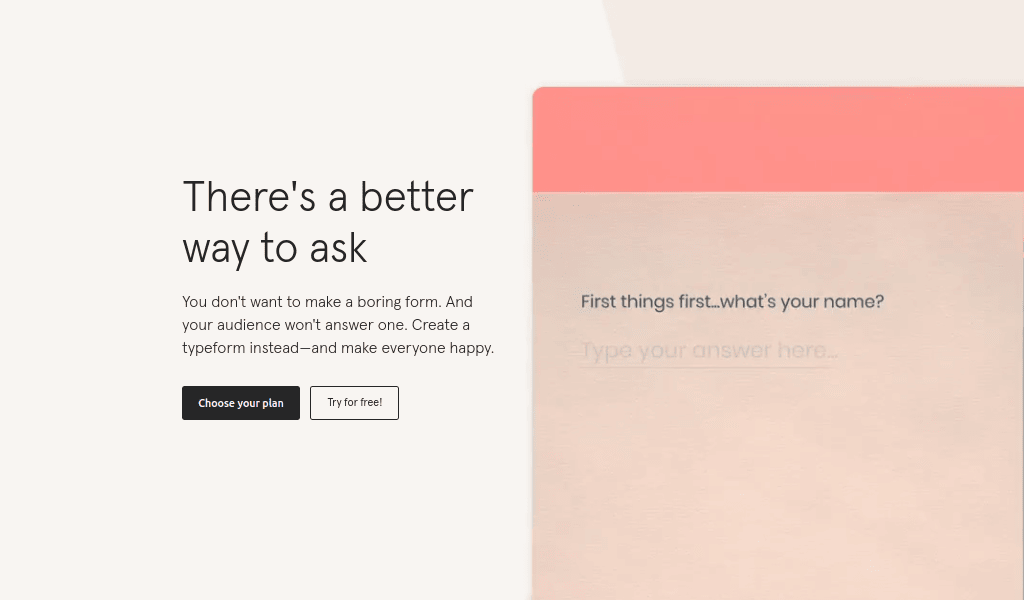
Typeform is a cloud-based survey collection and management solution that enables users to customize forms and surveys that are more conversational and people would like to fill in.
Typeform offers survey design, configuration, analytics, and distribution among other features. Inbuilt templates include different types of questions, like short-text answers, long-text answers, multiple-choice questions, picture selections, and drop-down menus. You can circulate surveys via on-site pop-ups and push notifications.
Reporting and dashboards make it easy for users to track performance metrics, like unique visits, responses, and survey completion status. This product management tool can be a useful choice for teams of all sizes.
Main features include:
- Custom templates
- Categorized forms
- 360 feedback
- Lead generation
- App integrations
- Branding questionnaire
- Signup sheet
Pricing:
The Paid plan starts from $25/month.
Customer Ratings:
- Capterra: 4.6/5 stars
- G2: 4.5/5 stars
20. Google Forms
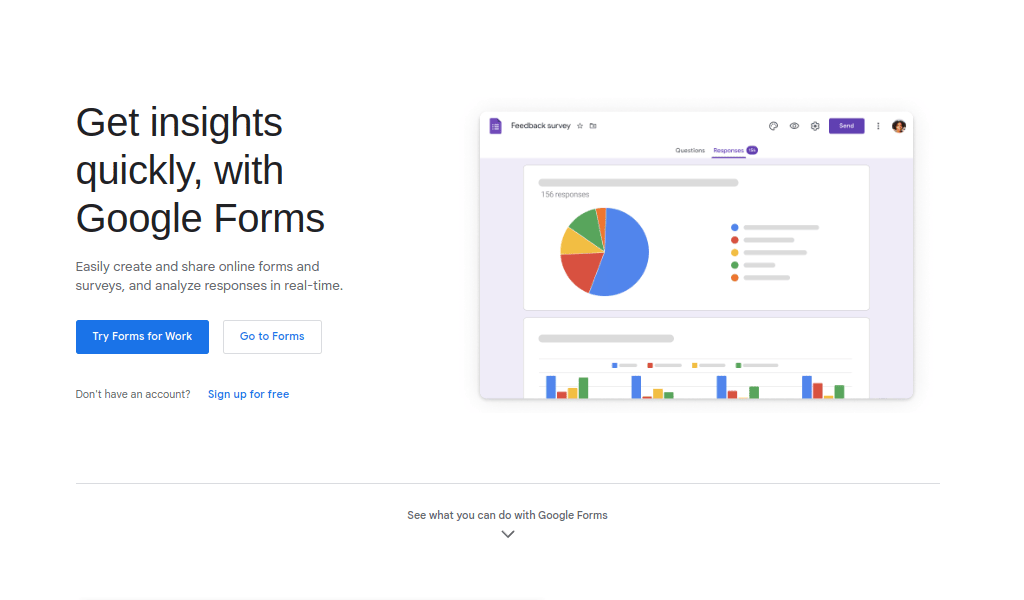
Google Forms is a free online platform that allows product management and marketing teams to easily create and share online forms. You can select from multiple question types, customize values, and drag and drop to reorder questions.
You can also personalize Google Forms with header images, and color themes, and you don’t necessarily need to have a Google account to create a form. You can choose a series of templates or create your own with the help of inbuilt customization options.
Q&A format is the core of Google Forms, as this online survey maker tool offers multiple question and response options, like dropdown, multiple-choice, and the linear scale. This is yet another product management tool that offers good functionality free of cost.
Main features include:
- Customize colors, images, and fonts
- Automatic summaries
- Access, create and edit forms on-the-go
- Share forms via email, link, or website
- Encrypted data
- Analyze responses in real-time
Pricing:
The Business Standard option is $12 a month per user.
Customer Ratings:
- Capterra: 4.7/5 stars
- G2: 4.2/5 stars
21. JotForm
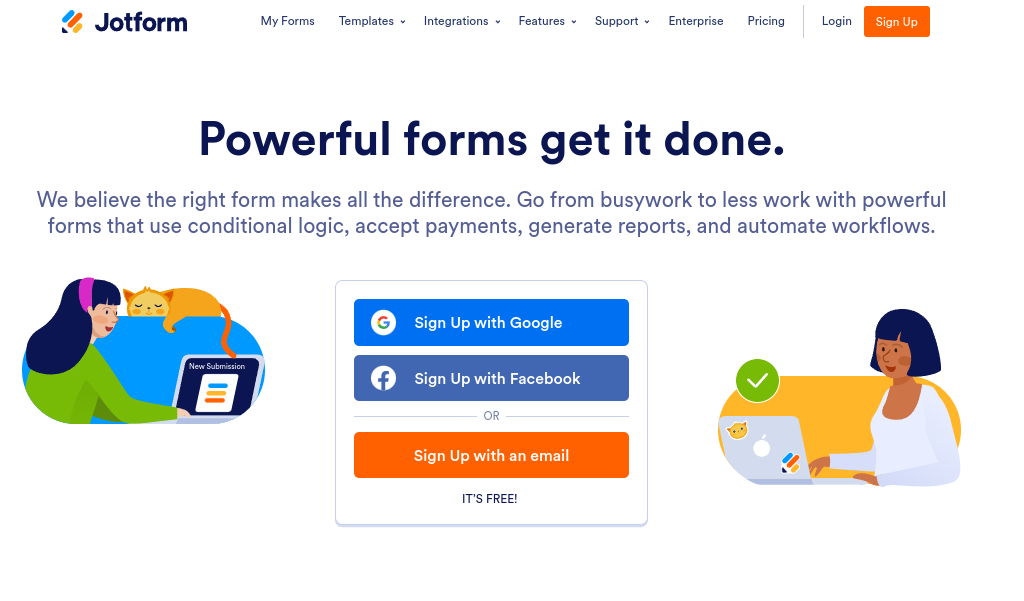
JotForm is a popular, free online form builder and form creator tool that can be of great use to product management teams across multiple industries. You can use JotForm to create powerful forms that use conditional logic, generate reports, accept payments, and more.
Using this tool, you can build the form you need within minutes and integrate these with the business apps you already use. The design process is versatile for you to customize your surveys while templates make it easy for users to get started.
Whether you’re selling a product or service, accepting payments, or collecting a donation, JotForm enables you to get paid directly via forms. You can also style your forms with your logo, fonts, and colors.
Main features include:
- Free templates and themes
- Straightforward dashboard
- 24/7 support via email
- Integrations
- Intuitive drag-and-drop designer
- Customization options
- Widgets
Pricing:
The Paid plan starts from $24/month, billed annually.
Customer Ratings:
- Capterra: 4.6/5 stars
- G2: 4.4/5 stars
Metrics and analytics tools
Metric and analytics tools are of great use for marketers, analysts, and researchers as they can obtain quantitative and qualitative information as well as other businesses. This information helps them to store and analyze insightful data to draft new marketing strategies or make changes in current plans.
22. Pendo.io
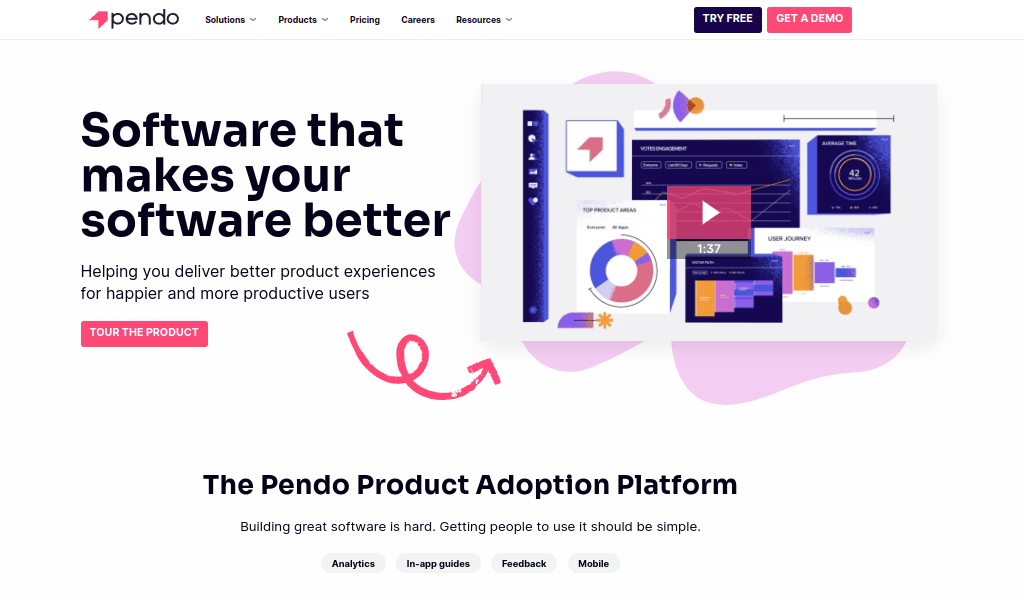
One of the most sought-after product management tools, Pendo is a product-analytics software solution designed to help software companies deliver improved product experiences for delighted and more productive users.
This metrics and analytics tool enables users to embed in their products a suite of tools for an overall better user experience. Pendo records product usage data accumulates user feedback, and facilitates in-app communication to onboard, educate, and provide users with value.
Originally designed for product teams, Pendo has developed into a tool that can also be used by marketing, sales, customer success, and UX teams to enhance their products.
Main features include:
- User boarding
- Product engagement
- In-app support
- Feedback collection
- Revenue growth
- In-app guides
- Analytics
- Roadmapping
Pricing:
Pricing is available on quote.
Customer ratings:
- Capterra: 4.5/5 stars
- G2: 4.5/5 stars
Software development tools
Software development tools are specifically designed to help coders and developers create, debug, and maintain software. Software development tools can be of many types – code editors, compilers, debuggers, performance analysis tools, GUI designers, etc.
23. Jira
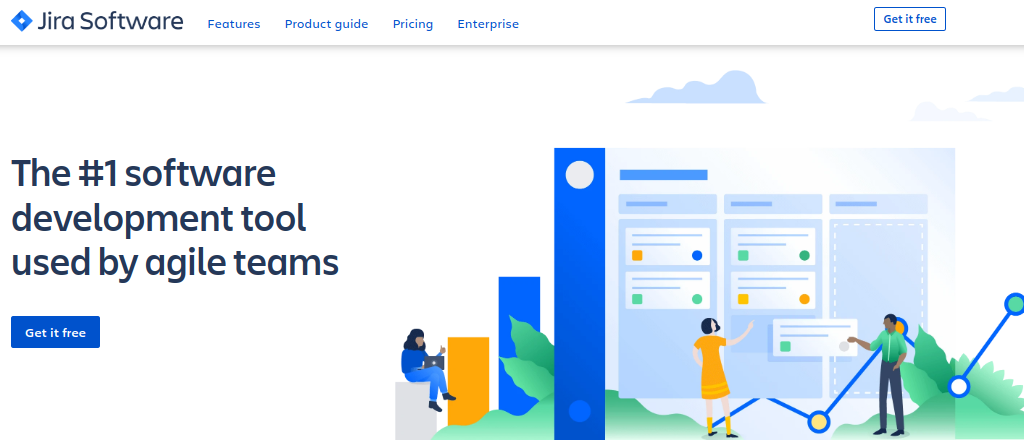
Originally designed as a bug and issue tracking tool, Jira is now a full-fledged work management tool that is used for all types of use cases, test case management, requirements, and agile software development. Product management features are among the most common use cases for Jira. Product teams can integrate Jira with the product roadmap, and sync their daily tasks with its big-picture strategy.
Jira is the central hub for collaboration, coding, and release stages. When it comes to testing management, Jira integrates with a wide range of add-ons and QA teams use customized screens, Jira issues, workflows, and fields to manage automated and manual tests.
Moreover, with the help of JIRA Kanban board teams can easily see the status of each task.
Main features include:
- Developer tool integrations
- Progress reporting
- Scrum boards
- Estimation logging
- Project-level permissions
- Issue tracking
- Customizable workflows
Pricing:
The Paid plan starts from $5/user/month.
Customer Ratings:
- Capterra: 4.4/5 stars
- G2: 4.2/5 stars
24. Aha.io
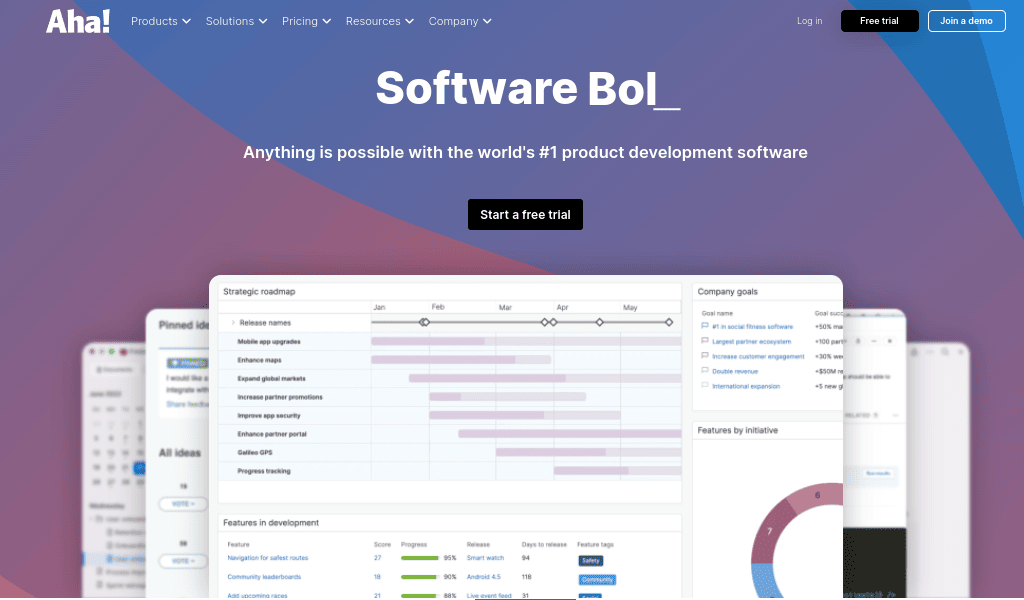
Aha.io is a leading product development tool that is used by a large number of SaaS tool companies to strategize, ideate, plan, showcase, build, and release new products. This product roadmap software allows marketers and product managers to thoroughly analyze products before giving them a final shape.
Aha offers a comprehensive suite of tools to product development teams to seamlessly collaborate to turn raw ideas into reality. Create and share product roadmaps, capture bright ideas, and manage agile development to build lovable products.
Product development teams can also do product road mapping on the fly, analyze and collaborate on them, and edit them at every stage. The tool automates complex processes and helps teams to do it quickly.
Main features include:
- An integrated set of tools
- Team collaboration
- Product concierge
- Prioritize backlog
- Scalability
- Customization
- Ease of deployment, administration, and maintenance
Pricing:
The Paid plan starts from $39/user/month.
Customer Ratings:
- Capterra: 4.7/.5 stars
- G2: 4.2/5 stars
Prototyping
25. Figma
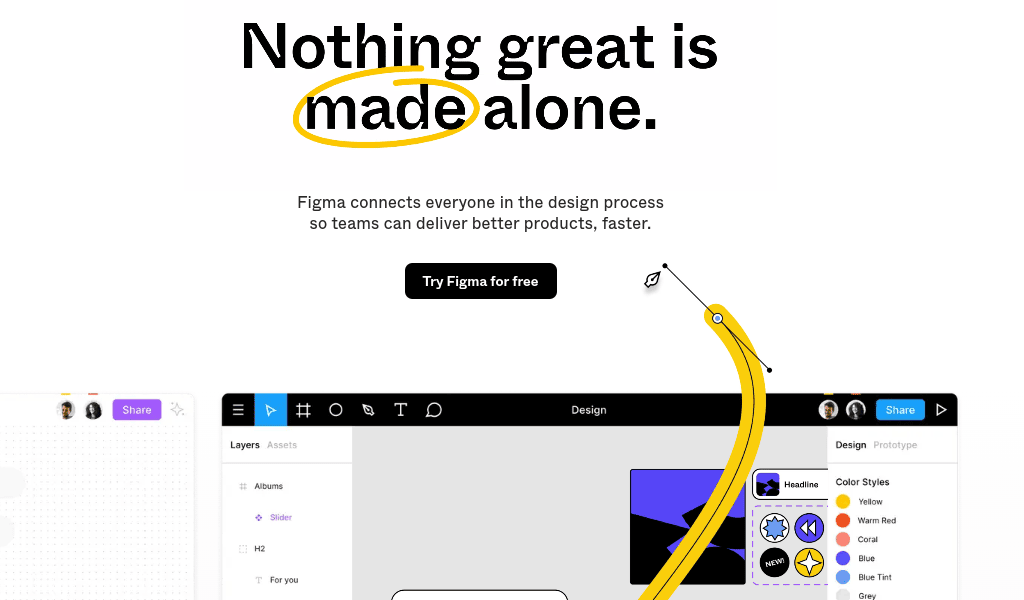
Prototyping tools are designed to help designers execute their design ideas faster and give them the final visual shape. Using prototyping tools, designers can have the final look and feel of their design, which further helps designers get valuable feedback from others and implement the required suggestions in the final product design.
Figma is one of the most advanced graphics editing software that helps to make team-based collaborative design projects. You can use Figma for graphics design work, creating mobile app interfaces, prototyping designs, creating social media posts, and more.
Figma runs directly on your browser and you can easily access your projects on any system without having to install the software. A generous free plan makes this tool one of the most preferred tools for designers as you can store as many as 3 active projects at a time.
Figma offers you various tools, vector tools, prototyping capabilities, and code generation for the design phase of the project. The tool allows for real-time, live collaboration. All team members can log into the design at once and make changes at the same time.
Main features include:
- Design
- Prototyping
- Design systems
- Downloads
- Accessibility and collaboration
- Smooth handoff to developers
- Connect multiple Figma accounts
- Zeplin integration
Pricing:
The Paid plan starts from $12/user/month, billed annually.
Customer Ratings:
- Capterra: 4.7/5 stars
- G2: 4.6/5 stars
26. Maze
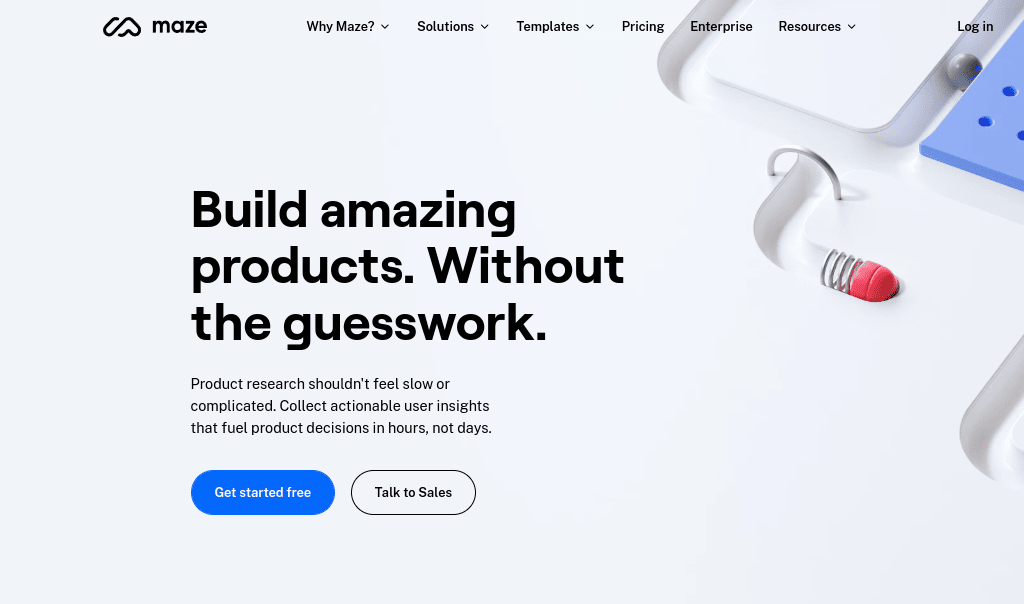
Maze is one of the leading rapid testing platforms that enables product and marketing teams to remotely test user-facing experiences and collaborate on projects via a common platform.
This cloud-based platform empowers agile teams to test, learn, and act swiftly to meet organizational goals.
Maze is also of great use for marketing and product management teams to sync and collaborate on various projects. Figma supports integration with Adobe XD, Figma, InVision, Marvel, Sketch, and other third-party applications.
Main features include:
- Prototype testing
- Tree testing
- 5-second test
- Surveys
- Panel
- Card sorting
- Video recordings
- Participant management
Pricing:
The Paid plan starts from $50/month for 2 seats, billed annually.
Customer Ratings:
- Capterra: 3.3/5 stars
- G2: 4.5/5 stars
User onboarding
User onboarding tools are specifically designed to help streamline, guide, and introduce a product or service to new users. These tools enable users to familiarize themselves with the product’s features and how to use them to yield desired results. The purpose of user onboarding tools is to understand the product quickly so that they can get the most value out of them.
27. Mixpanel
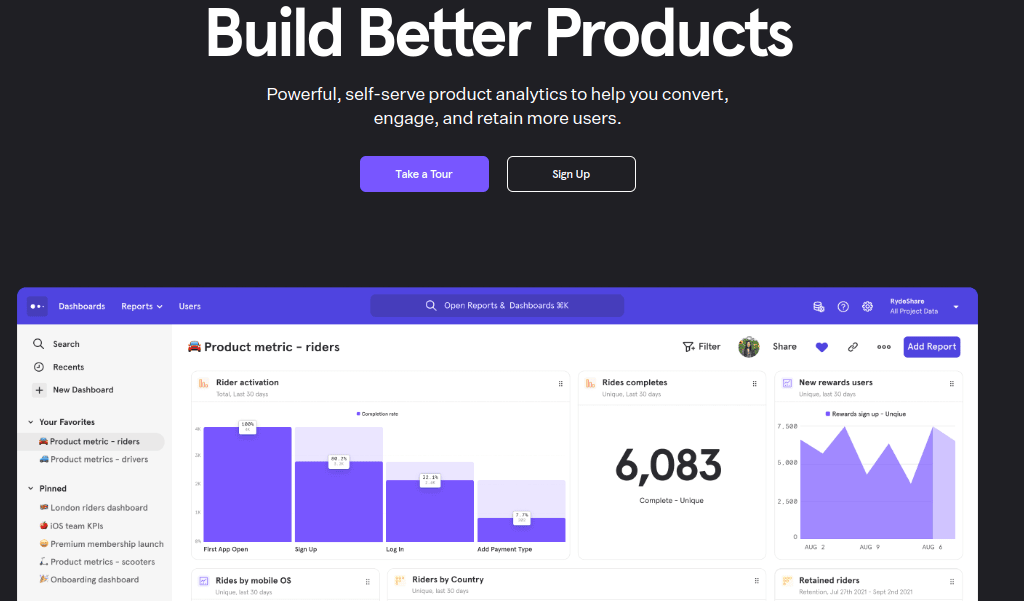
Mixpanel is a popular product analytics and user onboarding tool that captures data on how users interact with your digital product.
Mixpanel enables you to analyze the captured product data with simple and interactive reports. This mobile and website analytics software solution helps teams and companies of all sizes to monitor visitor behavior via tracking application interaction and engagement in real time.
Mixpanel records page views and generates reports on consumer actions and engagement within the application. Also, the tool allows you to dig deep into your analytics and ask specific queries about your users.
Main features include:
- Interactive reports
- Team dashboards and alerts
- Limitless segmentation
- Group analytics
- Data integration
- Data management
- Security and Privacy
- Scalable infrastructure
Pricing:
The Paid plan starts at $25/month.
Customer Ratings:
- Capterra: 4.5/5 stars
- G2: 4.5/5 stars
28. Amplitude
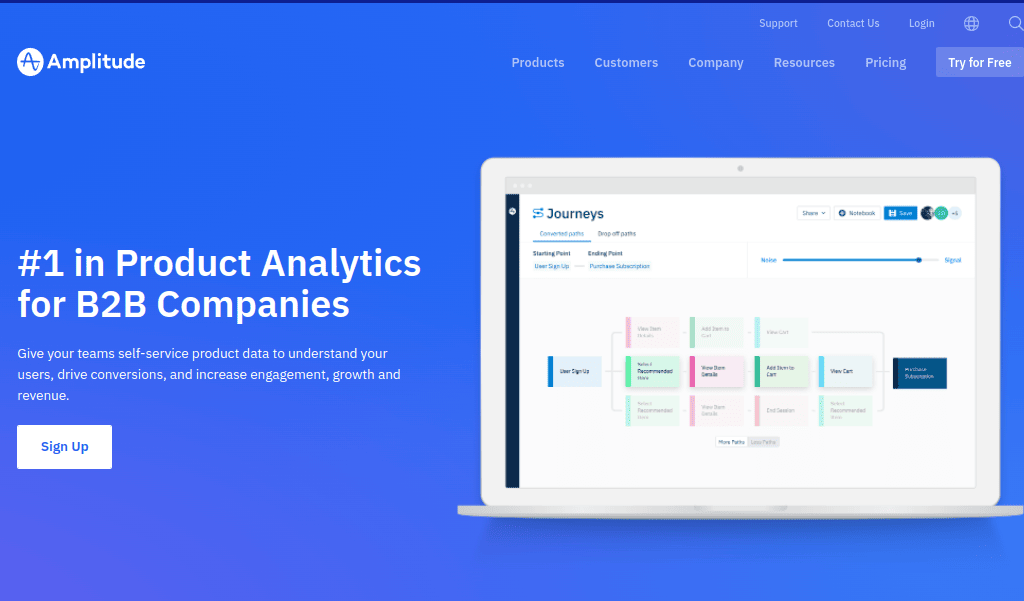
Amplitude is a reliable product analytics platform that acts as your most valuable resource when practicing user onboarding. With Amplitude, tracking insightful data will help you assess your performance, identify your weaknesses, study areas for improvement, and enable you to adapt your product to cater to customers’ growing expectations.
This product management platform allows you to measure a wide range of metrics and focuses on a user-friendly experience.
Amplitude offers advanced features, like insights into customer experience, a growth engine (beta) for product iteration, creating product portfolios, and SQL access for custom queries. You can also create a 360-degree view across the customers’ journey. Its growth engine creates hypothesis data by observing customer behavior while also enhancing winning features and campaign ideas.
Main features include:
- Product portfolios
- Growth engine for product iteration
- Data management
- Data connections
- Technology integrations
- SQL access
- Growth engine
Pricing:
Pricing plans are available on quote
Customer Ratings:
- Capterra: 4.5/5 stars
- G2: 4.5/5 stars
Flagging
Flagging tools are designed to enable software development teams to release new features quickly and safely. The purpose of these tools is to turn functionalities on or off to ensure safe testing during production. This is accomplished by separating code deployment from feature release. By presenting a prototype to the end-user, the developer can have valuable feedback for the project.
29. Split.io
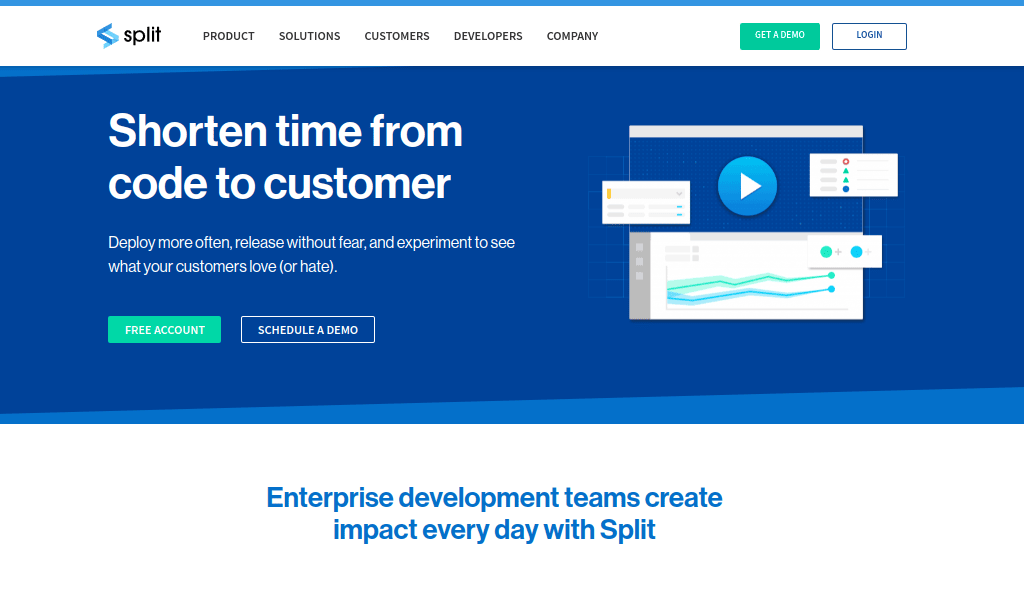
Split.io is a popular feature delivery platform that syncs the speed and reliability of feature flags with insightful data to gauge the impact of every feature. Split enables organizations to have a secure and reliable way to release features and target these to potential and existing customers.
The software automatically calculates the impact of features as soon as they go live. You can easily test new ideas while prioritizing data privacy. You can combine feature flags with ops data to identify release issues and features and resolve them instantly.
Pricing:
Pricing plans are available on quote.
Customer Ratings:
- Capterra: NA
- G2: 4.6/5 stars
30. LaunchDarkly
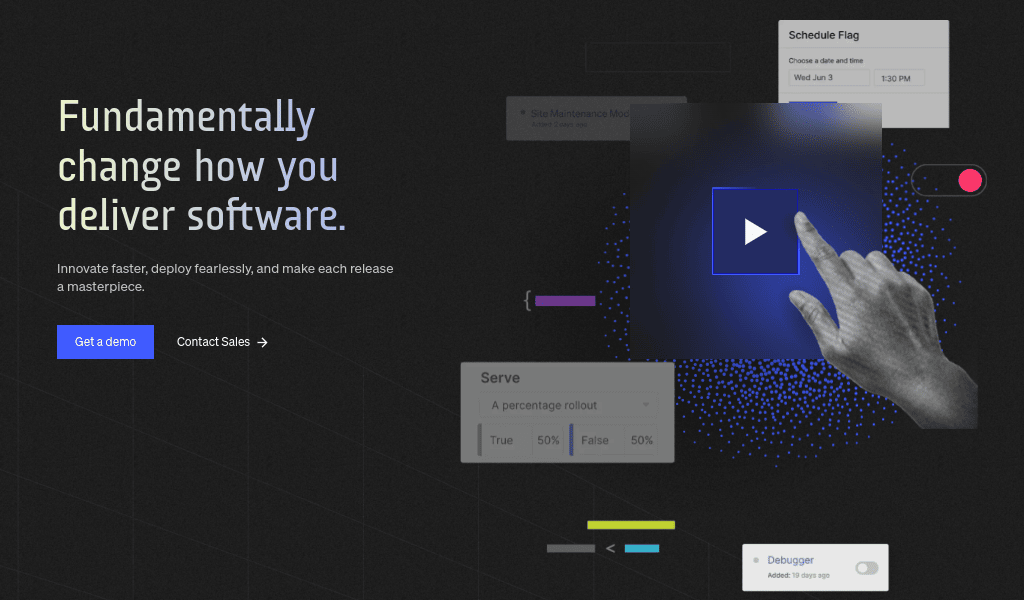
LaunchDarkly is a feature flag and toggle management tool that enables software engineers and non-engineers to have granular control over users’ experience, which further allows them to safely test in production, get valuable feedback quickly from users, and ship more in less time.
LaunchDarkly decouples feature rollout and code deployment, which enables developers to test their code live in production. Then they can gradually release features to user groups, and manage flags across their lifecycle.
LaunchDarkly offers SDKs for almost every language. From Android and iOS to Python, PHP, JavaScript, Ruby, and .NET, there are high chances that LD offers your chosen language. You can easily manage flags from the LaunchDarkly dashboard easily.
Main features include:
- Platform overview
- Feature flags
- Feature workflows
- Platform architecture
- Experimentation
- Data analytics
- Data export
Pricing:
The Paid plan starts from $8.33/user/month.
Customer Ratings:
- Capterra: 4.6/5 stars
- G2: 4.7/5 stars
How to choose the right product management tools?
How do you choose the right product management tools that suit your business? It can be overwhelming to pick the right choice out of so many software solutions designed for product management teams.
Let’s break this seemingly complex process down into simple, easy steps.
- Assess your product management team’s requirements: Create a list of your product management team’s requirements and check out which tool ticks the most boxes while evaluating them.
- Learning curve. Out of your shortlisted product management platform, which ones have a steep learning curve, and which ones have a fairly simple learning curve? It is suggested to choose a tool that your team members can quickly get to learn and use.
- Features. While each tool has its USPs, some essential features should be there in a product management tool. Make sure the tool you are considering offers features like task management, time tracking, file sharing, note-making, online proofing, etc.
- Define your product strategy. Identify your product’s features, and objectives, and list out what your product’s short-term and long-term goals are.
- Do research. Carry out thorough research on different product management solutions available. Read product reviews, and product management tool comparisons, and you can also sign up with tools offering freemium versions. This will help you understand how a particular tool works and what features it offers.
- App integrations. Does the tool allow integration with tools your team is already using?
- Pricing: Does the product management tool you are considering justify its price tag in proportion to the number of features offered, use cases, and customizable options? Check which tool offers the most value for money.
To summarize
Well, if I were to summarize this article, I would like to shed some light on the fact that product management is not a one-man job. A manager has to share responsibilities with a reliable tool. I hope I came through with my collection of tools to help you run your business smoothly in the year 2025.
I hope you found that most of the tools above can help your team simplify their work processes and become a more efficient and productive team. ProofHub, in this list of product management platforms, fits all categories and caters to all requirements at once.
Most of these tools come with a free trial, therefore, starting with the first tool on this list, you must try all of these product management tools at least once to find one with which you, your team, and your clients would like to settle.
Product management tools FAQs
What is product management software?
Product management tools simplifies and streamline the process of product ideation, planning, and execution for businesses. This tool helps teams to track the product life-cycle at every stage.
Who uses a product management tool?
Product management tool is used by product managers, product development teams, project managers, user research teams, and accounting teams.
What are the best product management tools?
Some of the best product management tools available today are ProofHub, SurveyMonkey, Workfront, and GoodDay.
What are the common features of a product management tools?
Some common features of product management tools are strategy and road mapping, testing, user tracking, analysis, design and prototyping, project tracking, etc.
What skills does a project manager need?
A project manager should have the following essential skills in today’s dynamic work environment – Technical expertise, Risk management, Scheduling and Time management, Smart communication, Critical thinking, and Problem-solving.
What is product management?
Product management simplifies and streamlines the process of product ideation, planning, and execution for businesses. Product management helps teams to track the product life cycle at every stage.

